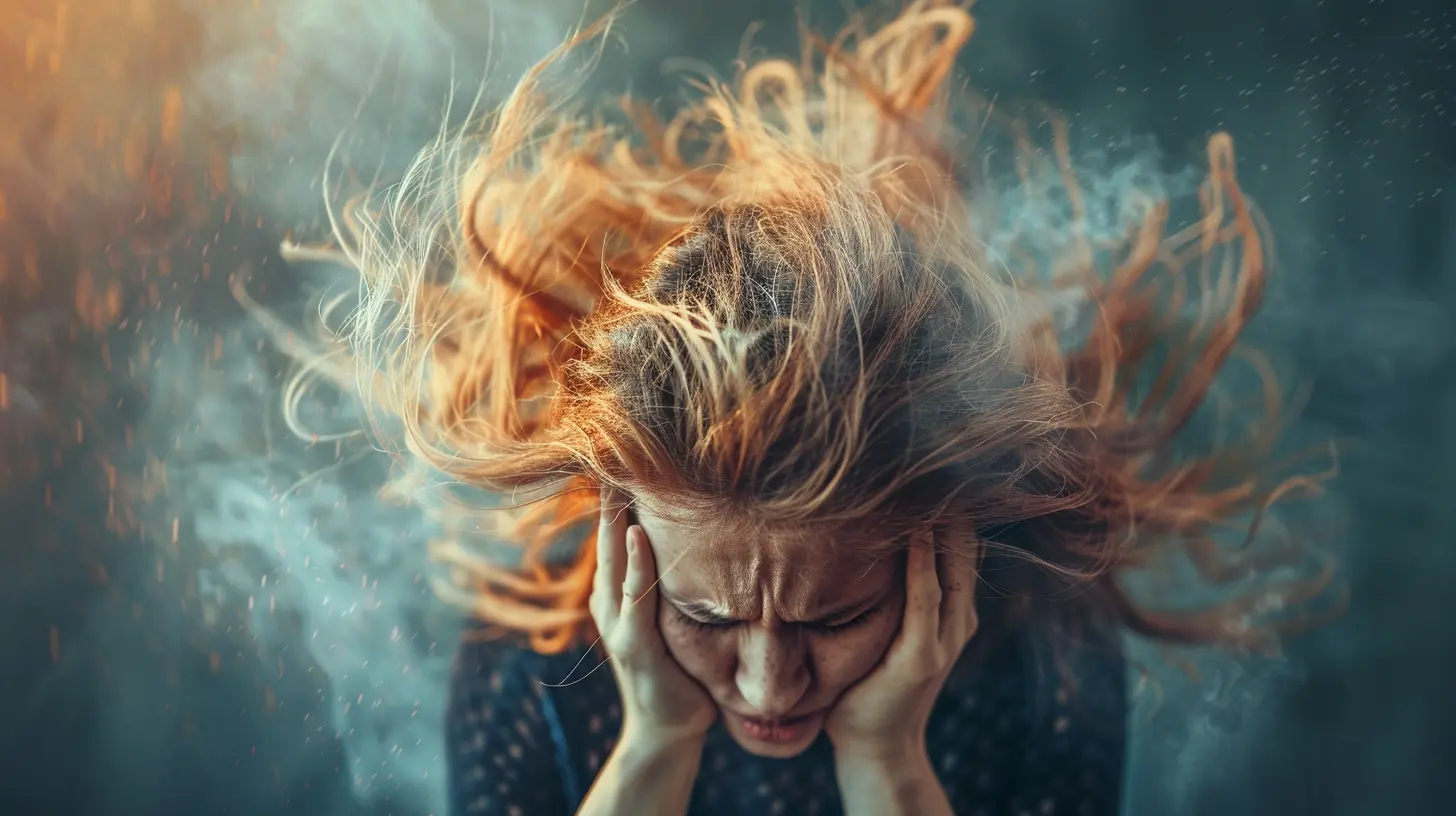The Effects of Stress on Hair Health and How to Manage It
4 July 2025
When life gets overwhelming, it's easy to feel like you're carrying the weight of the world on your shoulders. But did you know stress could also be weighing down your hair health? Yup, stress isn’t just that annoying feeling keeping you awake at night—it can mess with your luscious locks, too. Let’s break down how stress affects your hair, why that happens, and, most importantly, what you can do about it.
How Stress Impacts Hair Health
Stress is like that uninvited guest who overstays their welcome. At first, everything seems fine, but eventually, it throws things way out of balance—and your hair is no exception. Here are the main ways stress wreaks havoc on your strands:1. Hair Loss (Telogen Effluvium)
Ever notice your hair falling out in clumps during a particularly stressful time? That might be Telogen Effluvium (sounds like a Harry Potter spell, right?). It’s a temporary condition where stress pushes a large number of hair follicles into the "resting phase" of the growth cycle. Instead of growing, your hair starts shedding, leaving you wondering where all your volume went.Basically, it’s like your hair hit the snooze button and refused to wake up. And the worst part? This shedding typically shows up three months after the stressful event, so by the time you notice it, the cause might feel like ancient history.
2. Alopecia Areata
This one’s a bit more severe. Prolonged stress can confuse your immune system, making it attack your hair follicles as if they’re tiny enemies. The result? Patchy bald spots that can show up anywhere on your scalp—or even on your eyebrows or beard! It’s an autoimmune condition and can be incredibly distressing.3. Trichotillomania (Hair Pulling Disorder)
Ever caught yourself mindlessly tugging at your hair when you’re feeling pressured? That’s trichotillomania, a compulsive hair-pulling disorder often triggered by stress. It’s like your brain’s way of coping, but instead of solving the problem, it leaves you with thinning patches or bald spots.4. Weaker, Brittle Hair
Even if your hair isn’t falling out, stress can still leave it looking less than its best. High cortisol levels (that’s your stress hormone) can disrupt the protein building blocks of your hair, leaving it brittle, dull, and prone to breakage. Think of cortisol as a wrecking ball for your hair health—it knocks everything out of sync.
Why Does Stress Mess With Your Hair?
So, what’s the deal here? Why does stress target your hair like a bullseye? It all comes down to biology.When you’re stressed, your body goes into "fight or flight" mode. It’s like an alarm system—your body floods with cortisol and adrenaline, redirecting resources to essential survival functions. Guess what’s NOT considered essential? Growing your hair.
Stress also disrupts blood flow to your scalp, cutting off the nutrients and oxygen your follicles need to thrive. Imagine trying to grow a garden without sunlight or water—it just doesn’t work.
How to Manage Stress for Better Hair Health
Now, here comes the good news: You can fight back! While you can’t completely banish stress (life happens, after all), you can definitely manage it and help your hair bounce back. Here’s the plan:1. Prioritize Self-Care
First things first: Are you taking care of YOU? Self-care isn’t just bubble baths and face masks (though, honestly, those help too). It’s about making time to recharge—whether that’s going for a walk, meditating, journaling, or even just binge-watching your favorite show guilt-free.Stress is like running a marathon with no water—eventually, you’re going to burn out. Take breaks and refuel.
2. Get Your Nutrition On Point
Your hair craves nutrients to stay strong and healthy. Stress tends to deplete these nutrients, so stock up on hair-friendly foods:- Protein: Hair is mostly made of keratin, a protein. Load up on eggs, fish, lean meats, and tofu.
- Iron: Found in spinach, beans, and red meat, iron helps deliver oxygen to your hair follicles.
- Biotin and Zinc: These are your hair’s BFFs. Snack on nuts, seeds, and sweet potatoes.
- Omega-3 Fatty Acids: Found in fish and flaxseeds, omega-3s keep your scalp healthy and hydrated.
Think of food as fuel for your follicles—your hair can’t thrive without the right building blocks.
3. Practice Stress Management Techniques
This is a game-changer. Managing stress doesn’t have to mean a full lifestyle overhaul—just a few tweaks can make a big difference:- Exercise: Movement is magic. Whether it’s yoga, running, or dancing like nobody’s watching, exercise lowers cortisol levels and boosts endorphins (your happy hormones).
- Deep Breathing: Simple but effective. Take a few minutes each day to focus on slow, deep breaths. It’s like hitting the reset button for your nervous system.
- Meditation: Even 5–10 minutes of mindfulness a day can calm your racing thoughts and bring clarity.
- Prioritize Sleep: Sleep is when your body repairs itself. Aim for 7–9 hours of quality rest to give your hair—and your stress levels—a chance to recover.
4. Pamper Your Scalp
Your scalp deserves love, too! Stress can dry it out or cause buildup, which makes hair growth even harder. Treat yourself to a scalp massage using essential oils like lavender or rosemary. Not only does this boost blood flow, but it’s also super relaxing (two birds, one stone!).You can also try soothing scalp treatments or shampoos with natural ingredients. Avoid harsh chemicals or heat-styling tools that may further damage your hair.
5. Seek Professional Help When Needed
Sometimes stress becomes too much to handle on your own—and that’s okay. If you’re dealing with severe hair loss or stress-related conditions like alopecia areata, don’t hesitate to consult a doctor, dermatologist, or therapist. They can guide you toward treatments or therapies that work for your specific situation.
Can Your Hair Fully Recover From Stress?
The short answer? Usually, yes. The long answer? It takes time and patience. Hair naturally grows in cycles, so it may take several months for things to get back to normal—assuming you’ve managed to rein in your stress levels.In some cases, prolonged stress can permanently damage hair follicles, leading to thinner hair over time. But the earlier you address the issue, the better your chances of restoring your mane to its former glory.
Final Words of Encouragement
Look, life throws curveballs, and stress is just part of the package. But your hair isn’t doomed forever—far from it! By taking care of yourself, managing your stress, and nourishing your body, you can stop stress in its tracks and give your hair the love it deserves.Treat your hair like a garden: water it (hydrate!), feed it (nutrients!), and give it sunlight (metaphorically speaking, that’s your self-care). With some TLC, those strands will thank you—and you’ll feel like the gorgeous, confident person you are.
all images in this post were generated using AI tools
Category:
Healthy HairAuthor:

Sophia Wyatt
Discussion
rate this article
1 comments
Patricia Montgomery
Stress truly impacts our hair health—let's prioritize self-care for a healthier, happier life.
July 11, 2025 at 4:57 AM

Sophia Wyatt
Absolutely! Prioritizing self-care is essential for maintaining both our mental well-being and hair health. Small changes can make a big difference!


